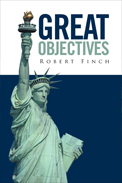
 |
Great Objectives makes a case for secular ethics. With a comprehensive takedown on around 18 salient points, Finch presents a thorough, credible, and persuasive position. This 500-page book is anchored on the thesis that ethics is not necessarily Christian. Rather, it is atheistic as much as it is Nietzschean. From a secular perspective, the basis of ethical knowledge is subjective emotion and meaning and our best understanding of the natural world, which constitutes truth. Finch argues that the brain controls our individual lives, and the mental faculty houses psychology and cognitive science. Finch weaves these claims around one particular tenet: ethical thinking does not need divine sanctions or supernatural revelations.
The book's main strength is its solid, contextual arguments and neat structure. The author did not use convoluted tag lines and did not attempt to enhance his credibility with big words and baffling jargons. Furthermore, the author's choice to establish the historical grounds for his study early on the discussion shows prudent consideration on the arrangement of thought and transition. Ethics as a topic of inquiry can border to philosophical and legal. Read: it can be a real dry undertaking. Finch, however, was able to showcase his in a gripping, rich presentation, encouraging a combo of intellectual and practical discussion on the topic.
As pointed out in the book, it was John Stuart Mill who did the first dig on and mention of the "great objects" of human life. Finch, however, owns it and makes it clear how these objectives constitute parts of a complete ethic. This book would be helpful to ethicists, students of philosophy and religion and those who are drawn to humanist ethic.